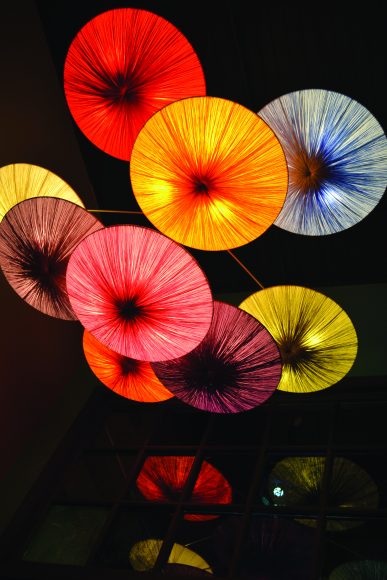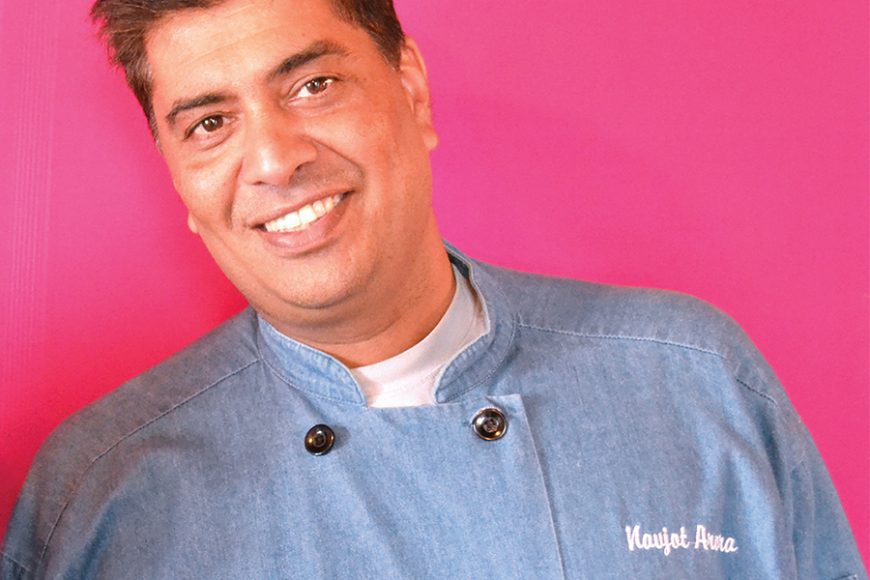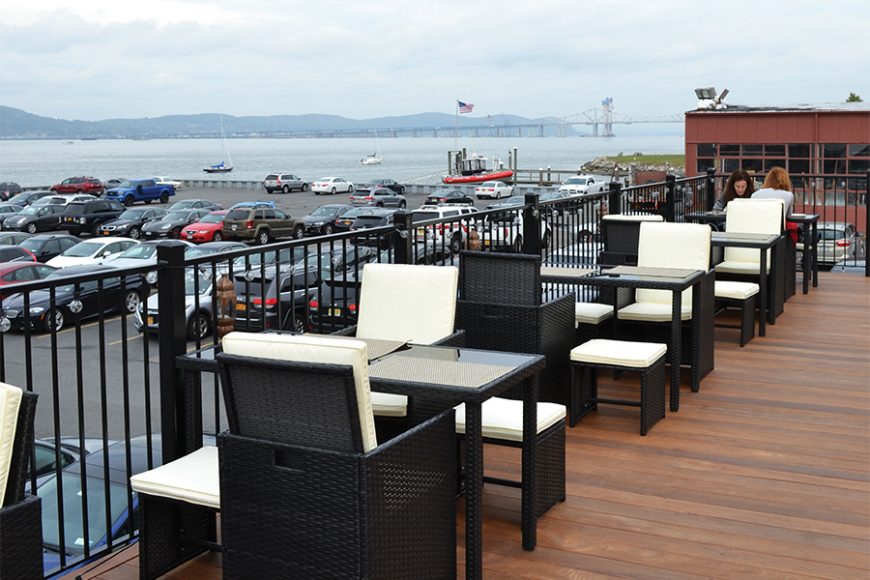If location is everything, then the deck of Navjot Arora’s Thai and Malaysian restaurant, Sambal, beside the Hudson River in Irvington, has it all. It also comes as a cheery surprise — since it is a truth universally acknowledged in the restaurant industry that great views and great food don’t usually go together — to find that the food at Sambal is both authentic and sophisticated. But there it is, the river — magnificent on account of its sheer size alone — and here we are, Sambal’s owner Navjot Arora and I, shooting the breeze at a relatively quiet, early-in-the-week dinner service on a balmy evening in late summer.
The restaurant has a history. Originally a lumber processing plant dating from the mid-19th century, the space was, immediately prior to Arora’s arrival, home to a rather dubious sushi joint called Flirt, where the ‘2 hot to handle’ and ‘fluke me salad’ were two of the tamer menu items.
Like the restaurant, Arora has history, too. Born in India, he was all set to become a doctor, but an interim stint at hotel school in Delhi convinced him that the kitchen was where his path lay. Joining the prestigious Taj group against his father’s wishes, he enjoyed a thoroughly well-rounded kitchen education, working in Taj hotels across the subcontinent before finding his way to the United States. When Arora took over the Irvington site in 2008 and opened his Indian restaurant, Chutney Masala, he was taking a giant leap of faith.
One of the challenges had always been persuading, or convincing, customers to try wholly unfamiliar dishes. “I believe in doing food I like, being true to its origins, its soul,” Arora says. While Indian curries and biryanis were mainstream enough when the original Chutney Masala opened, Arora did a series of tastings at senior centers in the area, to try to introduce older residents to the joys of Indian cooking, and ran stands at local markets to give people the opportunity of trying the cooking without a full-on commitment to a lunch or dinner they might not entirely enjoy. He also wanted parents to try the food for themselves and to convince them there were alternatives to pizza and pasta — for both them and their kids.
Unsurprisingly, perhaps, he still had difficulty convincing guests to try some of the more unusual, you might even say outlandish, dishes, such as sweetbreads (pancreas). A decade on at Chutney Masala — now relocated to another site in Irvington, at 76 Main St. — he has slowly begun to reintroduce more exotic dishes as diners have become more experienced and confident.
These issues repeated themselves to some extent when he opened Sambal three years ago, on the Chutney Masala site, although, as Arora points out, nearly all of the spices and flavors found in Thai and Malay cooking — curry, coconut, cilantro and chili, with the exception of lemon grass — are common to Southeast Asian and Indian cooking. Then again, dishes like pad thai, with its instantly accessible, lip-smacking flavors, and Malay mamak mango chicken — sweet and sour chicken wings with green onions, mango and pepper — are probably an easier sell than goat brains.
Cauliflower Manchurian, one of Sambal’s most popular starters, features crisp cauliflower in a tangy sweet and sour sauce. It’s a dish with real heft, almost meaty in texture, the crisp and moreish florets made vibrant with the piquant sauce. Arora tells me it is one of the restaurant’s best sellers. Another popular dish is pork momos, dumplings made in-house, filled with spicy minced pork and steamed so that the cushiony dough casing becomes almost malleable. The dishes lead into salads like crispy duck and Thai beef, the duck punctuated with tiny cubes of pineapple (a throwback to a more innocent gastronomic era — not every salad has to grow up after all), and the beef salad hitting all the right flavor notes.
Customers are discerning, Arora tells me, and there’s no way you can fool them with a “faux” cuisine, Indian, Thai or otherwise. And besides, why would he? The secret of his success, it strikes me, is that he does not dumb down the dishes. Just because customers may be unfamiliar with the cuisine, doesn’t mean Arora will compromise the cuisine’s integrity. Everything has to be done right, the simple dishes as well as the more complex. Soups like Tom Yum, the classic spicy Thai broth, are done exactly by the book, the Thai book that is — lemongrass broth with lime leaves, oyster mushrooms and chili, made heady with galangal. Another dish done right, without cutting corners, is green papaya salad, perfectly ripe fruit anointed with lime juice, with its texturally exciting topping of palm sugar and peanuts.
“If you can deliver good service, good food and value for money,” claims Arora, “the customers will come.” With sweet and obliging service, terrific food and fair prices, he is following his own recipe for success. It also helps that the restaurant looks as charming as it does — rich, scarlet banquettes beneath Moroccan lamps and paper lanterns, gentle acoustics and sympathetic lighting.
But back to the food: In the main dishes, curries are the constant in Thai cooking. They are also the mainstay of Sambal’s menu. The restaurant does a red, green and Penang curry, each one made creamy and luxurious with coconut cream and spiked with chili for varying degrees of heat — the fiery red curry being the hottest of the three. If you go the Malaysian route, rendang is a relatively dry curry, as subtle as it is rewarding. It is often made from beef, but at Sambal they are preparing it with chicken, the thighs slow-simmered in a spicy lemongrass, galangal and lime reduction. It’s a prince of curries.
When Arora leaves to attend to some kitchen business, I gaze out at the mighty Hudson. Night has almost fallen now, and I play a little game with myself. I imagine that I am on the banks of the Ganges at its widest point, under an inky black West Bengal night, or lazing on a glamorous hotel terrace, beside Bangkok’s great waterway, the Chao Phraya River. Then the rumble and gentle screech of the Metro-North train as it pulls into Irvington station wakes me from my reverie. The exotic rivers have gone but the dependable Hudson — and the thoroughly unswerving Sambal — thank goodness are still there.
Sambal is at 4 W. Main St. in Irvington. For reservations, call 914-478-2700 or visit sambalny.com.




